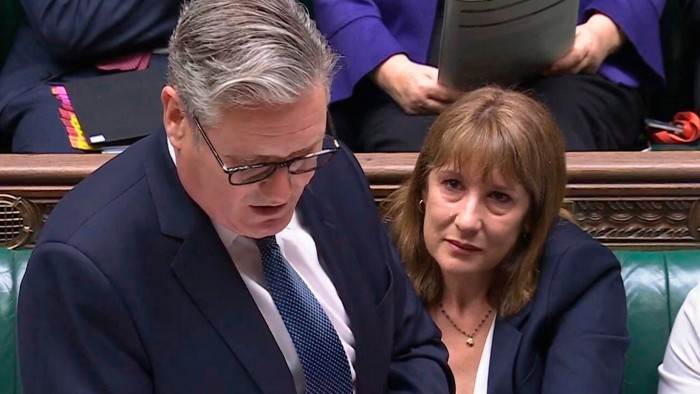Unlock the Editor’s Digest for free
Roula Khalaf, Editor of the FT, selects her favourite stories in this weekly newsletter.
This should have been a week when the UK government showed it was getting to grips with two key priorities: reform of welfare and the NHS. Instead, prime minister Sir Keir Starmer’s bumbling failure to back his visibly distressed chancellor Rachel Reeves in the Commons on Wednesday capped a disastrous few days for Labour. A sell-off of sterling assets was partially reversed after Starmer belatedly insisted Reeves would be in post for “many years to come” and the two publicly embraced on Thursday. But great damage has been done to the government and its political project.
Reeves herself has made errors, in presentation as much as in substance. She mishandled a defensible plan to remove winter fuel payments from millions of pensioners on which the government had to U-turn last month. Her desire to find extra cuts helped to shape the poorly-crafted welfare reform bill over which backbenchers, revolted forcing the government to stage a double retreat this week — wiping out all the projected £5bn savings.
Yet facing severe strains in the public finances, with markets still scarred by the Liz Truss mini-budget debacle of three years ago, Reeves has doggedly carried out the main task she was given: holding the fiscal line. She needed a prime minister able to give her political cover and craft a narrative to explain why the blood, sweat and tears will eventually be worthwhile. Starmer has fallen short on both.
His ducking of Conservative leader Kemi Badenoch’s invitation to confirm Reeves would still be in place by the next election was apparently a slip that reveals his lack of political nous rather than an attempt to distance himself from the chancellor. Starmer claimed on Thursday that, in the heat of Prime Minister’s Questions, he was “probably the last to appreciate” that Reeves was in tears beside him over what she says was a personal matter. In truth, neither of the two reasons a prime minister might wish to replace a chancellor — that they think someone else could better sell the existing strategy, or that they intend to change the strategy — appears true today. Wednesday’s market reaction, moreover, suggests investors are antsy that any successor to Reeves would loosen the fiscal line.
Yet this week has been, above all, the moment when the expectations of backbench Labour MPs, especially on the left, collided with the reality of the financial position the government, and the country, are in. Even if the partnership that has been at the heart of government can be repaired, the welfare cave-in will make things much harder from here, for Reeves in particular.
Including the £1.25bn cost of reversing the winter fuel payment cuts, the chancellor must now plug at least a £6.25bn hole in the public finances. As her team has been making clear, it means she cannot now afford to axe the two-child benefit cap, introduced by the Conservatives and loathed by many Labour backbenchers. With the slim “headroom” against her fiscal rules rapidly being wiped out, further tax rises in Reeves’ autumn budget are becoming ever more likely.
A year into the job, Starmer is unlikely suddenly to discover the rhetorical skills to inspire a nation. But he and his Downing Street operation must do a much better job of explaining to his backbenchers — especially the 231 newly elected last year — why debt at a postwar high means the government can only achieve its goals through difficult trade-offs and deft policymaking, not spraying money around. The biggest casualty of this week’s upheavals risks being the stable and grown-up governance that was Labour’s central electoral promise. It is clear, meanwhile, that markets are on a very short fuse.
